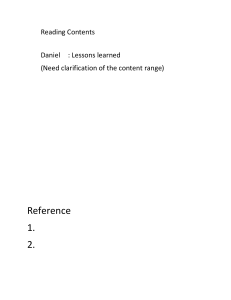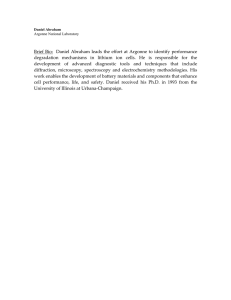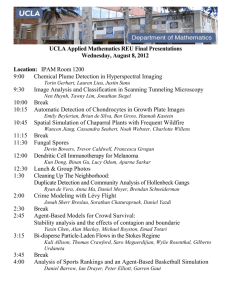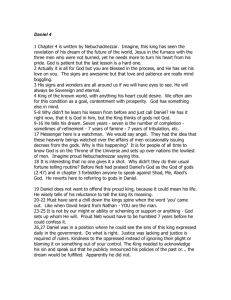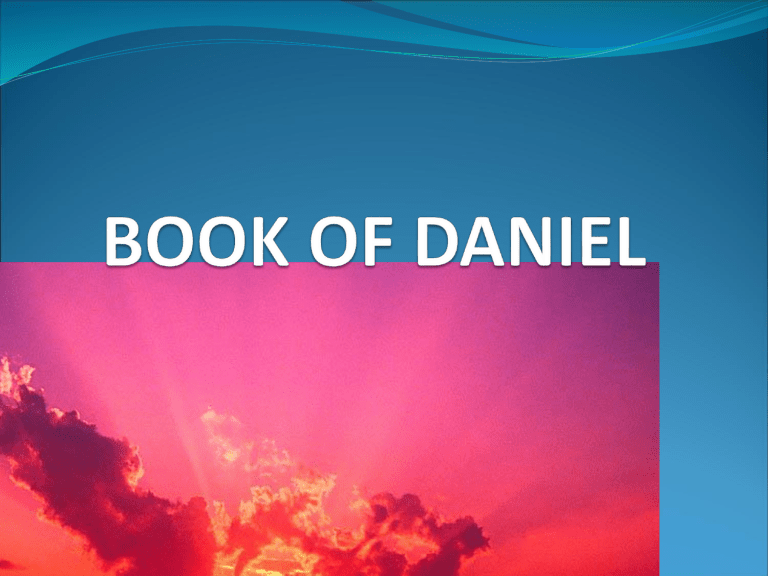
DANIEL IN HEBREW CANON TORAH LAW NUBIIM PROPHETS KETUBIM WRITINGS= DANIEL NAME MEANS “GOD IS MY JUDGE” BIBLICAL TESTIMONY EZEKIEL 14: 14, 20 Ezekiel 28: 3 Matthew 24: 15 ANCIENT TESTIMONIES 1 MAC. 2: 59, 60 JEWISH ANTIQUITIES X BY JOSEPHUS FLAVIUS LXX DSS PROPHETS AND PROPHECIES WRITE DANIEL, EZEKIEL, JEREMIAH DO NOT WRITE GAD, NATHAN TRUE PROPHETS JEREMIAH FALSE PROPHETS HANANIAH (JER. 28) PROPHETS AND PROPHECIES ESCHATALOGICAL PROPHECIES: (Time of the end; end of time.) APOCALYTIC PROPHECIES: (Dan.,Rev., Symbolic). MICRO-COSMIC: (On local basis, Jer. 28: 16, 17). MACRO-COSMIC: (ISA. 7: 14, applicable more than once). DANIEL THE PROPHET TRAGIC EVENTS IN JUDAH CITY OF JERUSALEM CAPTURED PROMINENT YOUNG CITIZENS DEPORTED AMONG WHOM WAS DANIEL BORN ABOUT 623BC INFLUENCED BY KING JOSIAH’S REFORM LIVED IN BABYLON MORE THAN 70 YEARS ONE OF THE THREE JEWISH PROPHETS OF THE EXILE, (EZEKIEL, JEREMIAH) JER. 43: 5-7; EZE. 14: 14, 20; 28:3. WITNESSED THE FALL OF BABYLON AND THE RISE OF MEDO-PERSIA ONE OF THE THREE CHIEF ADMINISTRATORS IN THE COURT OF THE PERSIAN KING SERVED AS A PROPHET NOT ONLY FOR HIS COUNTRYMEN IN EXILE, BUT FOR PAGAN KINGS AS WELL PURPOSE OF THE BOOK AS ANY OTHER BOOK OF THE OLD TESTAMENT, THE BOOK OF DANIEL WAS WRITTEN FOR THE PEOPLE OF JUDAH WHO LIVED AT THE PARTICULAR TIME OF HISTORY. WAS GIVEN PRIMARILY TO THE EXILED TO ACCOMMODATE THEIR NEEDS WHILE IN BABYLON IT ALSO CONTAINS PROPHECIES RELATED TO THE FUTURE TIME, GOING BEYOND EXILE TO OUR TIME AND BEYOND. THERE ARE FOUR BASIC QUESTIONS THAT THE BOOK ANSWERS: 1. IS THIS THE END OF THE KINGDOM OF JUDAH? 2. IS THIS THE END OF THE KING OF JUDAH? 3. IS THIS THE END OF THE SANCTUARY/TEMPLE? 4. IS THIS THE END OF THE PEOPLE OF GOD? PURPOSE OF THE BOOK The four questions are answered through four visions given to Daniel: The answer to the first question is found in chapter 2: God is in control of all the kingdoms and He will establish an eternal stone kingdom that shall never be destroyed. The answer to the second question is found in the vision of chapter 7: Inspite of the fact that, the king is blind and in captivity, the kingly lineage is not broken. Dan. 7: 13, 14 and 27. The King of the future will certainly come. PURPOSE OF THE BOOK The answer to the third question is given in the third vision of chapter 8: the readers attention is shifted towards heaven and the heavenly sanctuary. God’s people will be vindicated and the heavenly sanctuary cleansed. The answer to the fourth question is given in the fourth vision of chapter 12. Will the people of God be scattered throughout the Babylonian kingdom forever? In the final chapter, assurance is given, that the end of the faithful will never come. Even if death comes, there is eternal hope. BOOK OF DANIEL CHAPTER ONE The first verse of the chapter indicates that disaster came upon Jerusalem during the third year of Jehoiakim Discrepancy with Jeremiah 25:1, 9 and 46: 2 Who is correct, Daniel or Jeremiah? Is anybody wrong? Or is there an error re the date that tragedy overtook Judah? BOOK OF DANIEL CHAPTER ONE THE ANSWER: There were two systems of counting years of Kings, known as Accession and non-Accession systems. (The Chronology of the Hebrew Kings, Thiele 1977: 79; 1983: 43-44). in the Accession system, the first year of reign was not counted as the first year; it was known as accession year. The next year of reign would be considered the first year. BOOK OF DANIEL CHAPTER ONE In the non-accession system of counting, the year in which the king started his rule would be considered as his first year of reign. Babylonians are known to have used the accession system of counting. Since Daniel was in Babylon he adopted that system while Jeremiah who was in Jerusalem, used the traditional non-accession system of counting. Both counting systems give 605BC as the year in which these tragic events took place. BOOK OF DANIEL CHAPTER ONE EUNUCH: Hebrew word “saris”, which means court official. Gen. 37: 36. Eunuchs were court officials who worked with Kings. Did Potiphar have a wife? NEW NAMES Daniel: God is my Judge Hananiah: Grace of God Mishael: Who is like God Azariah: Lord has helped NEW NAMES Belteshazzar: May Bell preserve his life Shadrach: Order of Aku, Sumerian god of moon Meshach: Who is like Aku Abednego: Servant of Nebo/Nabu, god of wisdom LEARNING Daniel and his friends were educated in Babylonian schools. Just like Israel had schools of the prophets in the time of Elisha, Mesopotamia had schools. Daniel and his friends were exposed to different subjects, like: mathematics, astronomy, history, literature, poetry etc. They learnt how to make and prepare tablets for writing and to copy certain texts among other things. Here’s a description from a graduate student from one of the schools of Babylon: “My headmaster read my tablet, said: there is something missing.” caned me. The fellow in charge of neatness said: “you loitered in the streets and did not straighten up your clothes,” caned me. The fellow in charge of silence said: “why did you talk without permission,” caned me. The fellow in charge of good behavior said: “why did you rise without permission,” caned me. The fellow in charge of the gate said: “why did you go without permission,” caned me. The fellow in charge of the whip said, “why did you take… without permission,” caned me. The fellow in charge of Sumerian said, “why didn’t you speak Sumerian,” caned me. My teacher said: “your hand is unsatisfactory,” caned me. (And so) I (began to) hate scribal art, (began to) neglect the scribal art. The Sumerians: their History, Culture, and Character. Krammer, N. S. 1963: 238-239 DANIEL THE VEGETARIAN IDOL OFFETORY UNCLEEAN FOOD BY LEVITICAL LAW IT WAS NOT KOSHER; MAY HAVE BEEN MIXED Hebrew verb used. It means to appoint. Dan. 1:5 Apart from being used several times in the book of Jonah, this word is used only here in the Hebrew. Let’s examine usage in Jonah: “Mana” God appoints a great wind. Jonah 1: 4 God appoints a great fish. Jonah 1: 17 God appoints a gourd. Jonah 3: 6 God appoints a worm. Jonah 3: 7 God prepared an east wind. Jonah 3: 8 Usage in Jonah always designates God as the subject. Daniel could not eat because, it was not God who appoints but King. Had Daniel eaten, he would accept the King as his God. Much more was at stake, when he said no to the food, than just being a vegetarian. He risked his life. He wanted to show that the principles on which he stood would never change. DANIEL THE VEGETARIAN 10 times more intelligent, handsome, better behaving because of God’s grace. So, was Daniel a vegetarian? Daniel 10: 1-3 Health reform is not about vegetarianism It is rather about healthy lifestyle BOOK OF DANIEL CHAPTER 2 “The date for the events in chapter 2 is given in verse 1. It was the second year of Nebuchadnezzar’s reign. His second year is 603BC using the accession system of counting years of Kings. 605BC 604BC 603BC KING’S DREAM ACCESSION YEAR 1ST YEAR 2ND YEAR DANIEL’S TRAINING 1ST YEAR 2ND YEAR 3RD YEAR DANIEL’S TRAINING After graduation, Daniel and his friends were immediately employed by the King Himself as wise men of Babylon. No wonder, they were numbered among the wise men to be killed for not being able to tell the King his dream. CAUSES OF DREAMS OVER EATING UNDER EATING UNFINISHED BUSINESS FOR THE DAY UNHOLY INFLUENCES GOD HIMSELF THE DREAM: DREAM TROUBLED KING’S SPIRIT HIS SPIRIT WAS STRUCKED LIKE A HAMMER DRIVING A NAIL OR A BELL RINGING IT WAS RINGING IN HIS EARS THE DREAM THE KING SENSED THE IMPORTANCE OF THE DREAM. HE KNEW IT WAS ABOUT HIM. BUT HE COULD NOT REMEMBER THE DREAM. AND SO, THE KING DID THE BEST HE COULD HAVE DONE. The burden of chapter two is to answer the question: Is this the end of the Kingdom of Judah? And so, the wise men are called in to tell the King his dream and to provide interpretation. So, who are these wise men of Babylon? Are they the same ones schooled in Babylon’s schools? WISE MEN OF BABYLON THE WISE MEN WERE NOT SUPPOSED TO BE TRICKSTERS. WHY WOULD KING NEED TRICKSTERS AND ENTERTAINERS IN SUCH A SERIOUS MATTER? WERE THEY NOT LEGITIMATE WORKERS IN THE KING’S COURTS? WERE THEY NOT ON THE KING’S PAYROLL SO, WHO WERE THEY? MAGICIANS HEBREW WORD, “HARTOM”, NOUN, IT MEANS ENGRAVER HEBREW VERB “HERET”, WHICH MEANS SCRIBES THESE MEN WORKED IN TEMPLES THEY CLAIMED THEY HAD CONTACT WITH THE SPIRITS OR THE gods. AND SO IT WAS NOT UNREASONABLE FOR THE KING TO ASK THEM WHAT WAS IT THAT THE gods WERE TRYING TO TELL HIM. ENCHANTERS SECOND CLASS SUMMONED TO APPEAR BEFORE THE KING CLAIMED TO USE CHANTING AND THE PRONOUNCIATION OF CERTAN FORMULAS TO PROVOKE REACTION OF gods AND OR DEMONS CLAIMED TO BE ABLE TO DIVERT BAD OMENS FROM THEIR SUBJECTS SO KING WAS FULLY CONFIDENT THAT THEY WERE ABLE TO UNRAVEL THE MYSTERY. SORCERERS THIRD CLASS BROUGHT BEFORE THE KING. THIS WAS THE PRACTICE OF BLACK MAGIC NEBUCHADNEZZAR ACCEPTED THIS PRACTICE THEY CLAIMED TO BE ABLE TO MAKE CONTACT WITH EVIL SPIRITS AND TO EXORCISE THEM THEY ALSO CLAIMED TO PREVENT EVIL THINGS FROM HAPPENING TO THOSE WHO ASKED FOR HELP. CHALDEANS A SPECIAL ETHNIC GROUP NEBUCHADNEZZAR IS BELIEVED TO BE OF CHALDEAN ORIGIN THEY PERFECTED TWO FORMS OF ART: ASTRONOMY AND ASTROLOGY THEY WERE UNDISPUTED AUTHORITIES IN THESE TWO FIELDS STUDY MOVEMENT OF STARS AND PREDICT OMENS BY SUCH DANIEL AND HIS FRIENDS DANIEL AND HIS FRIENDS NUMBERED AMONG WISE MEN OF BABYLON. DANIEL 2: 13 SECRET REVEALED IN A NIGHT VISION. DAN. 2: 19 BUT THERE IS A GOD UP IN HEAVEN… DAN. 2:28 THE DREAM DANIEL 2: 31-36 INTERPRETATION OF DREAM GOLD-BABYLON (605-539 BC) SILVER-MEDO PERSIA (539-331 BC) BRASS-GREECE (331-168 BC) IRON-ROME (168BC- 476 AD) IRON/ CLAY (476 AD TO… IRON/ CLAY CONTINUATION OF FOURTH KINGDOM CLAY SUGGESTS DIVISION METAL REPRESENTS POLITICAL POWER CLAY IS ASSOCIATED WITH RELIGION THE ONLY POWER COMING OUT OF ROME WAS THE PAPACY. THE STONE FOCAL POINT STONE IS DIFFERENT FROM STATUE MATERIALS NOT MADE BY HUMAN CRAFT OR ART THE ORIGIN OF THE STONE SPEAKS VOLUMES IT CAME FROM THE MOUNTAIN THE STONE IN BABYLONIAN THINKING gods LIVED IN MOUNTAINS GOD IS TEACHING THE KING AN OBJECT LESSON KING CANNOT MISS THE POINT HE MUST KNOW WHO SENT THE STONE GOD SENT THE STONE PARALLELISM IN DANIEL THE SAME MESSAGE IN CHAPTER 2 CAN BE FOUND IN CHAPTERS 7 AND 8. DIFFERENT SYMBOLS ARE USED BUT THEY ALL MEAN THE SAME THING GOD IS REPEATING HIS WORD THAT WE MAY KNOW THE SURETY OF IT EACH CHAPTER GIVES MORE INFORMATION, NOT PREVIOUSLY REVEALED. BOOK OF DANIEL CHAPTER 3 WHEN AN AUTHOR WRITES, HE HAS AN AGENDA OR REASONS TO WRITE THE MAIN PURPOSE OF THE CHAPTER WAS THAT THERE WERE THREE YOUNG MEN WHO DID NOT BOW AND SO, THE TIME OF THE EVENTS OF CHAPTER THREE IS NOT SPECIFIED HOWEVER, ITS NOT LONG AFTER THE DREAM IN CHAPTER 2. PERSECUTION OF THE FAITHFUL THE OCCASION: 595/594 REVOLT BROKE OUT IN BABYLON ARCHAELOGY: KINGS CHRONICLES DISCOVERED AMONG RUINS OF BABYLON. A REVOLT BROKE OUT, KING HIMSELF HAD TO FIGHT THE OPPOSITION WITH THE SWORD IN HIS HAND THE OCCASION “In the tenth year the king of Akkad was in his own land; from the month of Kislev to the month of Tebeth there was rebellion in Akkad… with arms he (the King) slew many of his own army. His own hand captured his enemy.” Wiseman, D. J. 1956, Chronicles of the Chaldean Kings (626-556 BC). THE OCCASION KING REQUESTED PLEDGE OF ALLEGIANCE LIST OF FIFTY NAMES WAS FOUND RELATIVE TO THE TIME OF THE GOLDEN IMAGE THREE OF DANIEL’S FRIENDS WERE ON THE LIST: THE OCCASION NEBU ZARADAN JEREMIAH 39: 9-11. HE WAS A GENERAL IN THE ARMY NERGAL-SHAREZER JEREMIAH 39: 3 IT IS QUITE PROBABLE THAT ZEDEKIAH WAS SUMMONED TO BE PRESENT AS WELL JER. 51:59 THE OCCASION HE BECAME KING IN 597BC HIS FOURTH YEAR AS KING FALLS IN 594BC GREAT IMAGE EGYPTIANS, ROMANS AND GREEKS BUILT VERY BIG IMAGES MARDUK OF SOLID GOLD 18 FEET TEXT DOES NOT INDICATE WHETHER STATURE WAS THE KING HIMSELF, OR MARDUK OR ANY OTHER DEITY NEVERTHELESS, THE PURPOSE WAS EVIDENT: WORSHIP THE MAIN ISSUE IS WORSHIP NOT COMPLYING WAS DIRECT DISOBEDIENCE TO THE KING WAS ALSO A DISLOYALTY TO HIS gods DECREE COMMUNICATION NOT A PROBLEM ARAMAIC LANGUAGE LINGUA FRANCA (COMMON LANGUAGE) INSTRUMENTS MUSIC IN KINGS COURTS WAS COMMON FOR THE PURPOSE OF ENTERTAINMENT IN THIS CASE HOWEVER, MUSIC WAS USED TO MARK THE BEGINNING OF AN ACTION AND ALSO TO INITIATE RELIGIOUS FEELING THE TEXT MENTIONS 6 MUSICAL INSTRUMENTS: THREE WIND INSTRUMENTS AND THREE STRINGED INSTRUMENTS WHO WERE SUMMONED? DANIEL 3:2 ALL ON THE KINGS PAYROLL: THE LIST STARTED WITH THE HIGHEST OFFICE AND WENT DOWN TO ALL THE OFFICIALS OF THE PROVINCES WHEN THE KING’S ORCHESTRA SOUNDED ITS MUSIC, ALMOST ALL FOUND THEMSELVES WITH THEIR FACES IN THE DUST OF THE PLAIN OF DURA WHERE WAS DANIEL? TEXT DOES NOT INDICATE WHAT HAPPENED TO DANIEL AT THIS PARTICULAR TIME ALL THAT IS KNOWN IS THAT HE WAS NOT AMONG HIS 3 FRIENDS WHO STOOD TALL IN THE PLAIN OF DURA HOWEVER, IT IS UNIMAGINABLE THAT HE WOULD HAVE BEEN ONE OF THOSE WHO PAID HOMAGE TO THE IMAGE WHERE WAS DANIEL? TWO EXPLANATIONS FOR HIS ABSENCE FROM THE LIST: FIRST, HIS LOYALTY WAS WELL ESTABLISHED AND HE SERVED THE CROWN NOT JUST AS A SATRAP OR OFFICIAL BUT AS THEIR CHIEF, THEREFORE HE MIGHT NOT HAVE BEEN REQUIRED TO BE THERE SECOND, BECAUSE OF HIS HIGH POSITION, HE MIGHT HAVE BEEN ABSENT, TRAVELLING THROUGHT THE PROVINCES, TAKING CARE OF KING’S AFFAIRS WHERE WAS DANIEL? ARCHAELOGICAL DISCOVERIES FOUND AMONG THE RUINS OF BABYLON SOME FIFTY NAMES, WHO WERE SUMMONED TO THE DEDICATION DANIEL’S 3 FRIENDS WERE NAMED, BUT DANIEL’S NAME WAS NOT FOUND (Shea W. 1982, Daniel 3: Exxtra-Biblical Texts and the Convocation of the Plain of Dura. 20: 29-52) THE FURNACE DAN 3: 6 THROWING PRISONERS IN A FURNACE WAS NOT AN UNCOMMON PRACTICE IN BABYLON KING NEBUCHADNEZZAR ORDERED THE EXECUTION OF ZEDEKIAH AND AHAB WHO WERE “ROASTED IN THE FIRE” JER. 29: 22 IT WAS HORRIBLE TO BE PUNISHED BY FIRE THE FURNACE HUGE FURNACES PRESENT THROUGHOUT THE PROVINCE OF BABYLON READILY AVAILABLE FOR SEVERAL INDUSTRIES: PRODUCTION OF POTTERY: BAKED IN KILNS OR FURNACES RESULTING IN BETTER QUALITY AND DURABILITY OF POTS METALLURGY: ANOTHER IMPORTANT INDUSTRY MASSIVE PRODUCTION OF BRICKS FURNACES FURTHER, KING WAS FAMOUS AS A GREAT BUILDER SINCE BABYLON WAS LOCATED ON A FLAT LAND, IT LACKED STONES FOR BUILDING PURPOSES THE ONLY ALTERNATIVE LEFT WAS BUILDING WITH BRICKS FURNACES WERE ALSO INVENTED FOR GLAZING: ADDING DECORATIVE COLOURS TO THE BRICKS TO BE USED TO BEAUTIFY WALL SURFACES. FURNACES HIGHER TEMPERATURES WERE NECESSARY FOR QUALITY GLAZING DELIVERANCE FIRE, HEAT AND SMOKE WAS VERY FRIGHTENING BUT NOT FOR THE THREE SERVANTS OF GOD THEY DECIDED TO STAY FAITHFUL TO GOD REGARDLESS OF CONSEQUENCES DELIVERANCE KING SHOCKED AT WHAT HE SAW IN THE FIRE HE SAW “ONE LIKE THE SON OF MAN” IN THE FIRE WITH THE FAITHFUL THE PAGAN KING HAD TO ADMIT FOR THE SECOND TIME, THAT THE GOD OF HEAVEN IS INDEED THE LIVING GOD. HE RECOGNIZED HIM BUT WAS NOT READY OR WILLING TO COMIT HIS LIFE TO HIM GOD WAS ABOUT TO TEACH HIM A LESSON BOOK OF DANIEL CHAPTER 4 In this chapter, a second dream of Nebuchadnezzar is recorded. Written as a testimony of a Pagan King or as Daniel as told by the King It happened in reality It seems that the building activities of the King were completed (4:30) His empire enjoyed great prosperity and relative peace (4:4) THE DREAM In this second dream, the focal figure is the King himself He witnessed on several occasions the power and might of Daniel’s God, yet he remained the same unchanged person He failed to make any change in his personal life This dream was God’s final warning to the King By the time he woke up, he knew the dream was about him and his kingdom THE DREAM Unlike chapter 2, he remembered the dream Wise men were summoned and the result was the same as with the first dream But Daniel was finally summoned (vs 9) The King saw a tree in his dream (vs 10) Position of the tree is very important (middle of the Earth) (10) THE DREAM It provides shelter for beasts of the field and birds It provided food for all flesh (vs 12) Suddenly the dream was interrupted by the appearance of a Watcher (vs 13) Attention is now drawn from the tree to the Watcher Watcher means, “one who is awake” The aramic word translated as “watcher”, is “ir” Used 3 times in this chapter and never again Translated: messenger, angel or watcher THE DREAM No doubt in the King’s mind, that this was a heavenly being, with power over Kings, small and great, insignificant and mighty The watcher commanded that the tree be cut down The stump was to be bound in iron and bronze (16), his kingdom will be kept safe for him when he returns From hereon, it becomes a man who is to live outside as an animal His mind/heart is changed and he pretends to be an animal THE DREAM According to 4:16, this is to last for “seven times” “Time” has four seasons Four seasons make one year BOOK OF DANIEL CHAPTER 4 In chapter four, King had a dream Dream was about King himself Unlike chapter 2, King remembers the dream Daniel is called after wise men failed again Interpretation of dream and illness BOOK OF DANIEL CHAPTER 4 Illness started one year after the dream He reigned 43 years (605-562BC) Dream was had in 571BC One year after that King became ill DANIEL CHAPTER 5 This chapter has to do with the punishment of another Pagan King. Even though the chapter does not provide details concerning the date of the events, one can conclude that they occurred in 539BC, when the kingdom of Babylon fell into the hands of Medo-Persians. BELSHAZZAR THE KING He was a deeply religious man He was fully aware of the experience that his predecessor, King Nebuchadnezzar went through He knew about Daniel and his three friends, and about the image, the furnace and the deliverance God has provided BELSHAZZAR THE KING He also knew about the prophecy from chapter two and perhaps chapters 7 and 8, where Babylon’s fall to the Persians was prophecied THE FEAST It was the last night that Belshazzar would be King of Babylon For some reason, the Medes and Persians surrounded the city walls, yet the feast was organized Feasting in ancient times was not uncommon THE FEAST The text does not indicate why he had a feast. There are several possibilities however: 1. It could have been a moral booster for the people of Babylon. It served as assurance that there was no reason for concern, since the walls were impenetratable. 2. It is possible that even though Babylon was under siege, it was a time for some yearly festival. To demonstrate that everything was under control, the King ordered the feast to be celebrated regardless of the political situation and crises imposed by MedoPersia. THE FEAST While the banquet was in progress, the King ordered vessels to be brought from the temple to serve drink to his guests These vessels were stored in the temple as trophies from the time of the conquest some seventy years earlier It was customary to strip conquered nations of their gods and their treasure as indication that the conqueror’s gods were superior THE FEAST For decades, these vessels were stored in the temple Belshazzar being intoxicated with wine and/or beer, ordered that the vessels taken from the temple in Jerusalem, be brought to the banquet DRANK WINE IN THEM IT IS KNOWN THAT BEER PRODUCTION WAS VERY POPULAR IN BABYLON ARCHAEOLOGICAL DISCOVERIES UNEARTHED EVIDENCE THAT BEER WAS PRODUCED FROM BARLEY SO WHY DID BELSHAZZAR USE WINE RATHER THAN BEER? DRANK WINE IN THEM HE DELIBERATELY DESECRATED THE OBJECTS FROM THE TEMPLE TO DEMONSTRATE THAT HIS GODS WERE IN CONTROL THIS WAS A PROPAGANDA TO THE GUESTS AT THE BANQUET THAT MEDO-PERSIAN ARMIES WOULD BE DEFEATED, AND THAT THE GOD OF DANIEL WAS POWERLESS AND HIS PROPHECIES WOULD NEVER COME TRUE DRANK WIINE IN THEM FURTHER TO THIS SACRILEGIOUS ACT, HE DELIBERATELY USED WINE FOR THE BANQUET IN MESOPOTAMIA, WINE WAS ONLY USED FOR SACRIFICIAL PURPOSES IN TEMPLES BY USING WINE AT THIS BANQUET, KING STOOD IN DEFIANCE OF ALL gods IN BABYLON DRANK WINE IN THEM HE DEMONSTRATED THAT HE STOOD EQUAL TO ANY OF TH EWEM AS SUCH, EQUALITY WITH DIVINITY WOULD HAVE GIVEN HIM RIGHT AND LIBERTY TO USE THE VESSELS FROM THE TEMPLE IN JERUSALEM BUT THE PARTY ENDED ABRUPTLY WHEN THE WRITING ON A WALL APPEARED PALM OF A HAND Whose hand? Writing was unknown However, when the hand wrote, they were immediately sober King’s knees started to shake His cheek went up and down All because he knew it was about him. WRITING ON THE WALL THE MESSAGE ON THE WALL WAS WRITTEN IN ARAMIC. FOUR WORDS WERE WRITTEN ON THE WALL, AND THE FIRST ONE WAS REPEATED TWICE THE WORDS ARE: mene mene tekel upharsin IMMEDIATELY HE KNEW THAT THE MESSAGE WAS ABOUT HIM WRITING ON THE WALL THE FIRST 3 WORDS REFERRED TO THE KING HIMSELF, WHILE THE LAST ONE REFER TO HIS KINGDOM THESE WORDS USED IN PARTICIPLE PASSIVE FORM WHAT DOES A PARTICIPLE DO TO A VERB? WRITING ON THE WALL IT CHANGES VERB INTO NOUN WHENEVER PARTICIPLE FORM IS USED IN THE OLD TESTAMENT, ITS FOR A SPECIAL PURPOSE BECAUSE IT HAS POWER ONE WHO IS NUMBERED, WEIGHED AND DIVIDED WRITING ON THE WALL THESE WERE ALSO MARKET MEASURES HE KNEW EXACTLY WHAT THEY MEANT MARKET MEASURES SYMBOLISE JUDGEMENT AND COURT LANGUAGE DANIEL TO THE RESCUE When Daniel appeared in the room, he rebuked the King without apology, for being ignorant of God’s power concerning the revelation God gave his grandfather Nebuchadnezzar (5: 22, 23). With ease and without fear, Daniel interpreted the message on the wall: Mene means, “one who is numbered,” it represents “mina” (600 grams) DANIEL TO THE RESCUE Tekel means, “one who is weighed,” it represents “shekel” (10 grams) Upharsin means, “one who is divided,” it stands for “half of mina” (300 grams) Belshazzar’s days were numbered. He was weighed out and found wanting and his kingdom would be divided. Isaiah 45: 1 GOD’S WORD WILL COME TO PASS Belshazzar was suppose to grasp the meaning of this message, since it was market language Language of measures implies judgement in biblical context (1 Sam. 2:3; Job 31: 6) That same night, the Medo-Persian army, took control of Babylon almost without a fight. That same night, King Belshazzar was executed BOOK OF DANIEL CHAPTER 6 The events took place in the first year, after the fall of Babylon Jeremiah’s 70 years prophecy has been fulfilled Jewish captives are returning home Daniel however, chose to remain in Babylon ANOTHER PERSECUTION OF THE FAITHFUL Daniel was a very old man. If he were 18, when he entered Babylon in 605BC, then in 539BC he was about 84 years old. A new government had taken over Daniel however, was continually distinguishing himself as a man of God. He was providing honest service irrespective of who was in power BOOK OF DANIEL CHAPTER 7 VERY IMPORTANT CHAPTER OF THE BOOK OF DANIEL SOME ARGUE THAT IT IS THE MOST IMPORTANT CHAPTER IN THE BOOK THIS CHAPTER IS WRITTEN IN ARAMAIC LANGUAGE IT ALSO MARKS THE END OF THE PORTION OF THE BOOK WRITTEN IN SAME LANGUAGE RELATIONSHIP CHAPTERS 1-6 WRITTEN IN THIRD PERSON CHAPTERS 7-12 WRITTEN IN FIRST PERSON CHAPTERS 1-6 WRITTEN IN CHRONOLOGICAL SEQUENCE CHAPTERS 7-12 ALSO WRITTEN IN CHRONOLOGICAL SEQUENCE RELATIONSHIP 7TH CHAPTER , 1ST YEAR OF BELSHAZZAR 8TH CHAPTER, THIRD YEAR OF BELSHAZZAR 9TH CHAPTER , 1ST YEAR OF DARIUS THE MEDE CHAPTERS 10-12, 3RD YEAR OF CYRUS DATE OF THE EVENTS IT WAS THE FIRST YEAR OF BELSHAZZAR HE RECEIVED BABYLON FROM HIS FATHER IT HAPPENED DURING THE 3RD YEAR OF NABONIDUS NABONIDUS BECAME RULER OF BABYLON IN 556BC DATE OF THE EVENTS HIS 3RD YEAR IS 553BC DANIEL WAS 70 YEARS OLD CONTENT OF THE VISION THE VISION CAME TO DANIEL IN A DREAM HE SAW 4 WINDS, INDICATING THE FOUR DIRECTIONS OF THE WORLD THE HAVOC CREATED BY THESE WINDS IS UNIVERSAL WINDS ALSO REPRESENT GOD’S JUDGEMENT (ZECH. 7: 14; HOSEAH 8: 7) LION Lion represents Babylon. It has wings of an Eagle. Lion (Jer. 4: 7; 49: 19, 20; 50: 17, 14) Eagle (Jer. 49: 22; Lam. 4: 19, Eze. 17: 3 and Hab. 1: 8) Eagle and Lion in prophecy stand for Babylon LION The torn wings also represent the insanity of the King All of a sudden, the same Lion that represents Babylon now represents the King In fact, it begins moving on 2 feet rather than four Human’s heart means that Kings sanity would return BEAR Raised up on one side Dominance of one province (Persia) This limping Beast just killed something and still has the 3 ribs between its teeth: Lydia (546BC); Babylon (539BC) and Egypt (525BC) LEOPARD Four heads and four wings The only animal faster is Cheetah (when it catches its prey-it needs 2 hours to come back to its senses. Wings represents extra speed ALEXANDER THE GREAT Alexander the Great invaded Persia in 334 BC He died in 323BC Four heads- four Generals: Antipater- Greece and Macedonia Lysimachus- Asia Minor (Present day Turkey) Seleucus- Syria and Babylon Ptolemy- Palestine and Egypt UNRECOGNIZABLE BEAST Iron teeth Ten horns As heads before horns represent kings Little horn appears Three were destroyed, as a result of little horn growing up It had eyes and mouth (all ten horns were mouthless and eyeless) except little horn Intelligence (eyes and mouth) FALL OF THE ROMAN EMPIRE EMPIRE FINALLY CRUMBLES 476 AD IT DISINTEGRATED INTO TEN KINGDOMS LITTLE HORN- 7 CHARACTERISTICS 1. 2. 3. 4. 5. 6. 7. IT CAME OUT OF THE FOURTH BEAST IT APPEARED AMONG TEN HORNS BY ITS GROWTH 3 WERE PLUCKED OUT IT HAD EYES AND MOUTH IT SPOKE AGAINST THE MOST HIGH IT CHANGED GOD’S LAW IT PERSECUTED THE SAINTS OF GOD IT CAME OUT OF THE TH 4 BEAST It is the same power as in chapter 2 Little horn appears on the 4th Beast There is only one recognizable power coming after the Roman Empire It is the Papacy or what we call papal Rome IT APPEARED AMONG 10 EXISTING HORNS It appeared only after 10 horns were established Only power which came into existence at that time was the papacy 3 HORNS PLUCKED OUT It is 5th century AD Most of Europe is Christian Arianism accepted by some tribes Clash of beliefs Church used political influence to destroy the heretic tribes Visigoths, Vandals and Ostrogoths EYES AND MOUTH Eyes stand for intelligence Mouth stand for ability to influence WHAT LITTLE HORN DOES? It speaks great words against the Most High True Worshippers: Enter to worship and depart to serve!
